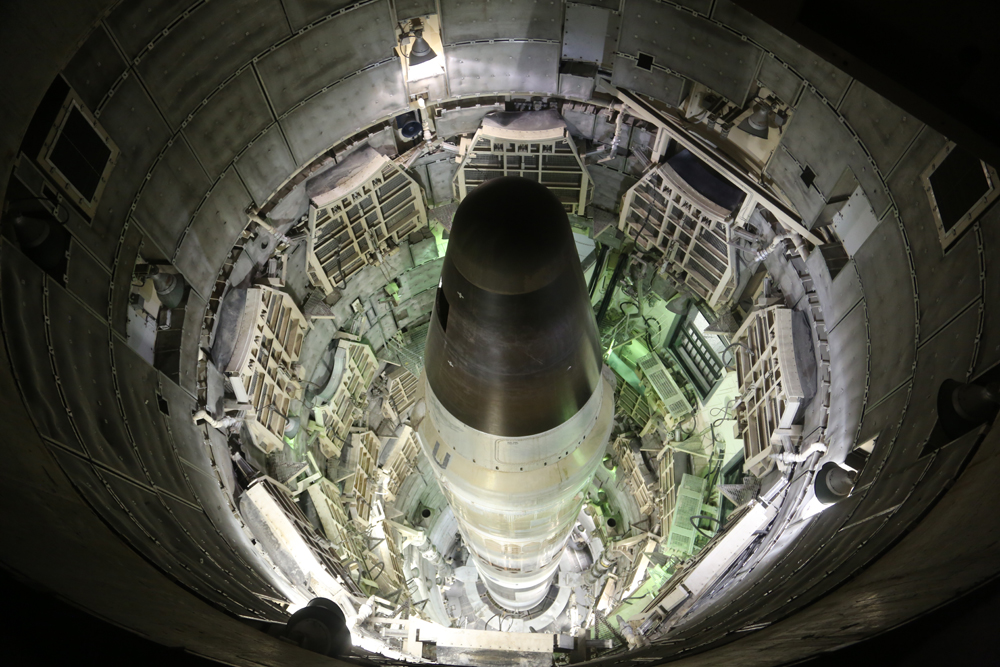It was only after taking his mother to see “Command and Control” recently that Senior Airman Dave Powell told her about the time in 1980 when he dropped an eight-pound socket into the bowels of a Strategic Air Command center in Damascus, Arkansas, puncturing the side of a Titan II nuclear missile during routine maintenances that could’ve laid waste to the rest of the state and beyond had it not been for the quick thinking of himself and his fellow officers on the premises.
“Can you imagine?” asks Robert Kenner, who still managed to be surprised despite having others tell their story for what felt like the first time in “Command and Control.” “People lead segmented lives and this just opened the floodgates.”
Powell’s mother was hardly the only one who hadn’t heard the story of the Damascus accident before and given the little attention paid to America’s nuclear weapons program, thanks to the lack of necessity to use them in recent years, it likely would’ve gone the way of the now-buried missile silo just outside of Little Rock. Yet “Command and Control” vividly brings the fraught hours of crisis back to life, through the urgent reporting of Eric Schlosser, whose book of the same name inspired the film, and Kenner’s ability to convey the true scale of the near-disaster through recreations in the Titan Missile Museum in Green Valley, Arizona using the latest drone technology. While an unexpectedly propulsive nail-biter emerges from the second collaboration between the pair behind “Food Inc.,” so does a portrait of human strength in the face of imminent threat and the fallibility of even the most safeguarded weaponry.
As the film starts roll out across the country and the frequent question has cropped up of who next will have the authority to authorize a nuclear missile launch as our next president during this election cycle, Kenner and Schlosser spoke about reuniting on “Command and Control” and the process of adaptation, as well as the rare chance for the documentarian to play with explosives and bringing the subject of nuclear weapons back to the surface considering the thousands that America still has at the ready.
 At what point did this become a film? Had Eric already finished writing it?
At what point did this become a film? Had Eric already finished writing it?
Eric Schlosser: When the book was in an early stage, I had Robby read it just because I wanted to know what he thought of it. Later, he thought that he could find a way to make it into a documentary.
Robert Kenner: Eric did this amazing work at uncovering the freedom of information files, which I just think is a real national service. But it was the fact that you heard about this event …where were you?
Eric Schlosser: I was spending time with members of the Air Force Space Command, these officers who were thinking about satellite warfare. They started telling me stories of nuclear weapons accidents during the Cold War and one of them was about the Damascus accident. I was just amazed I never heard it before, and the reason I hadn’t heard of it was because the Pentagon was very adamant that there was no chance the warhead could’ve detonated. I started digging and when I found out that was a lie, it became a much more interesting story.
Robert Kenner: When Eric sent me a picture of the last Titan II site, it took us a while to gain the trust [of those that were there], but once that happened, it enabled us to make a techno thriller, which as a filmmaker was a really fun [opportunity to do] about something that happens to be about something scary and true.
Of course, there is the book to lean on, but once you were at the Titan Missile Museum in Green Valley, Arizona, which is nearly identical to the Titan II missile silo in Damascus, did it actually inform how you would tell this story?
Robert Kenner: I thought here is this amazing book, and there’s some footage – Air Force training films, some Command Center footage and some footage from outside that night [of the Damascus accident] where you see Jeff Kennedy and [Senior Airman James] Sandaker going back in, which was amazing that we found it, but obviously there’s no footage when the socket dropped or the Command Center during those few hours.
[The Titan Missile Museum is] an identical location to the Damascus location and anywhere you put the camera was an amazing image. To be able to put drones between the missile and the wall that’s four feet away and go up 10 or 11 stories was pretty extraordinary. Five years ago, that would be a $5 million Hollywood set with pulleys, so it was more that we had the story, which was told through the voices of the people that were all there and we were able to put the camera where there was no camera that night and bring it to life.Eric Schlosser: The thing about the silo is it’s so worth a visit. You can talk about nuclear weapons and nuclear strategy and about the history, but then when you’re in this place, it feels very real, like this could really happen whereas it’s all theoretical [otherwise]. Earlier this week, I was at a Minuteman missile silo, which is the kind of missile we have now, and I’ve been [researching] this subject for nine years now. I’ve read so much, I’ve gotten all these documents and this Minuteman visit the other day was really unnerving, even more [so] in some ways than the Titan II site because we don’t have the Titan II missile anymore. We do have the Minuteman and when you see this place, it’s like oh my God.
Robert Kenner: Don’t you think the film takes you [there?] You don’t have to go there now. You could save the transportation. It’s only $15 and you get the same thrill. [laughs]
Given the subjects you traditionally cover as a documentarian, you probably never thought you’d be setting off explosions.
Robert Kenner: We had Michael Bay’s pyrotechnic guy who came out! Ironically, the woman who runs the [Titan Missile] Museum at first was very cautious, saying you can’t do this and you can’t do that. And by the end, she was saying we could blow this or that up and she brought fire trucks out. She was thoroughly into it because as Eric had said to me, this is a film that’s honoring these men who were real heroes that night. They were passed over by the Air Force and spit out because it was easier to say it was human error rather than systemic error. But now, after Eric’s book and this film, it’s really changed their lives. The undersecretary of the Air Force from that period wants to honor these men and a number of Secretary of Defenses have come up to them and hugged these guys. Because these guys have paid the price, suffered and put their lives at risk and basically gotten no thanks whatsoever.
Since so little attention had been paid to this, did it actually make things easier in terms of drawing out your subjects?
Eric Schlosser: When I was doing the book, Wikipedia was an enormous impediment because a lot of these guys would look me up and assume that I was going to do this exposé ripping the military to bits. So that was hard, but you’re right in the sense that people aren’t talking about this and that I think encouraged a lot of these guys. It’s so important they have this hidden knowledge that’s hugely relevant today, and they want people to know.
Robert Kenner: Yeah, for me, it’s like the war films I’ve done, [where] people on all sides of the issues want to come back because it was the most intense moment of their lives. There was nothing that will ever equal this moment for those guys…
Eric Schlosser: We hope.
Robert Kenner: Yeah, and in a way, it was putting closure on it. As Eric has said, this is the most important issue that no one’s talking about, so that’s what drew me to it, but [I didn’t] want to deal with it like “Merchants of Doubt” or “Food Inc.”, which were more essay films. [This was thinking] “Hey, why don’t we make an exciting techno-thriller and maybe younger people will want to come see it and realize the importance and the danger and help start a conversation.”
 Since many of these men had been interviewed for the book, were there actually things that came to the surface the second time around on camera?
Since many of these men had been interviewed for the book, were there actually things that came to the surface the second time around on camera?
Robert Kenner: I appreciate the fact that [Eric and I] have very different skills. Eric is going around spending a lot of time with people, in effect uncovering what the story is, because he’s working without a clock and putting something together out of nothing. I have to do it in a few hours in a dark room with a camera, which is intimidating. I know what the story is, so I have certain advantages, but it’s also about the emotional component for me because I can’t put my own overview on it – really what they’re giving to the camera is the only thing that exists, so it’s a very different process. I don’t think I could do what Eric does.
Eric Schlosser: And I could not do what Robby does. I love the footage in the missile silo — the drone shots and the technical aspects of the film that look so cool — but the heart of the film for me is the story of these young guys and how they’re treated and mistreated, and it’s amazing how Robby can take people who have never been before a camera, put them in this darkened room with lights – a completely unnatural situation — and get them to be authentic. That’s really an art and he does it amazingly well. There are certain people who you interview who can’t go to that place and he was able to really bring it out of the people he talked to.
Robert Kenner: Dave Powell [the Senior Airman who was a repairman on the Propellant Transfer System Team at Damascus] came and he was very cheery, but he said, “I didn’t want to tell those guys…” – he was [a little] dismissive, as if [the accident] was just something that happened. You just felt you weren’t getting him. And he was the only person I asked back, but he had shaved his mustache. He didn’t want to come to begin with, and he probably [did] because of Eric or because of his wife, and I said, “You need to come back because I don’t think you told me what you really are thinking.” So we had to wait for him to grow his mustache back — I contemplated getting a fake mustache, but somehow to get emotional with the fake mustache wasn’t going to work [laughs] — and he came back and said, “You know, sometimes I can think about this if I try.” I said, “Something tells me every time you close your eyes, you’re thinking of [this]. And you see at the end of the film, he starts to shake and a tear comes down and he can’t help but see this every day and the trauma that he suffered, so he was ready to go back there, but it took a while.
[Col. John] Moser was fun because we went out to dinner and he was telling me the night before about all the things he wasn’t going to talk about. When you’re in the room, it’s not like you can get someone to tell something, but he just couldn’t help but talk about [the moment] he actually felt the weapon had gone off.Eric Schlosser: The thing that really struck me in watching these interviews that Robby was doing was how many of these military men of a certain generation and a certain personality type, cried. [Partially] because they felt comfortable with Robby to do that, but it was also an indication of how 35 years after the event, in a moment, it could just be vivid again. They can just feel the emotion of it again.
Robert Kenner: You know, I’ve done Guadalcanal, which was over 30 years ago…
Eric Schlosser: You mean the war or the film? [both laugh]
Robert Kenner: There’s something [about] these guys [and how they] have blocked it and this is the same. On “Two Days in October,” we had a box of Kleenex and we had to change it every day because people would go through it. People block these things out and they have not dealt with [these memories] and somehow being in a dark room and just getting back there — in some weird way, you expect it would be less emotional – but it just brings back things so quickly.
Eric Schlosser: A number of these guys had been suffering from PTSD. It was like being in a war zone.
On a lighter note, how did you find Sam, the dairy farmer?
Eric Schlosser: I started out by looking at news clippings from the Arkansas Gazette from that period and he was in one, talking about how he was a neighbor of the silo, so I just tracked him down.
Robert Kenner: When he came on to the set, he said, “Where should I put my cowboy hat?” And I said, “On your head.”
 Has it been interesting releasing during a presidential cycle where it’s been brought up so many times how important it is that you’re electing the person whose finger it will be on the trigger?
Has it been interesting releasing during a presidential cycle where it’s been brought up so many times how important it is that you’re electing the person whose finger it will be on the trigger?
Robert Kenner: Oh Eric’s really good at this one.
It’s not surprising you’ve been asked before.
Eric Schlosser: People forget that only the president of the United States can authorize the use of nuclear weapons. It’s not something that Congress is involved in at all.
Robert Kenner: Unlike going to war.
Eric Schlosser: Because of the decision-making time, so you want a president who’s calm and rational and stable…
Robert Kenner: Not thin-skinned. We’ll leave it up to the public to decide. [pause] Which could be the scary part.
“Command and Control” is currently opening in theaters across the country, including a run at the NuArt in Los Angeles starting on September 30th. A full list of theaters and dates is here.




